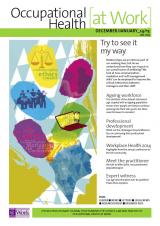December/January 2014/2015 (vol. 11/4)
ContentsFeaturesNewsLegal
NewsResearch DigestResearch PlusCPD
Research Plus
Recovery expectations: cohort study
A prospective cohort study of people undergoing physiotherapy for work-related musculoskeletal disorders of the back or neck (published after the above systematic review) found that lower expectations of recovery not only lowered the probability of a return to work (RTW) but also mediated the relationship between depressive symptoms and RTW. It followed 140 patients referred to six physiotherapy clinics. Each was given three sessions a week for up to seven weeks, or until they returned to work. Participants were asked to rate as a percentage their likelihood of returning to some form of employment within the next month. RTW was assessed at 12 and 24 months. High scores for depressive symptoms (at least 14 on the Beck Depression Inventory) and poor recovery expectations (self-rated less than 62.5%) were both associated with low RTW rates (p = 0.01 and < 0.001, respectively). Recovery expectations remained predictive of RTW status in the regression analysis after controlling for personal and demographic factors (p < 0.001). However, after controlling for expectations, depressive symptoms were no longer predictive (p = 0.09).
The mediating role of recovery expectancies on the relation between depression and return-to-work. Journal of Occupational Rehabilitation 2014; online first: doi: 10.1007/s10926-014-9543-
Occupational Health at Work December/January 2014/2015 (vol. 11/4) pp39



